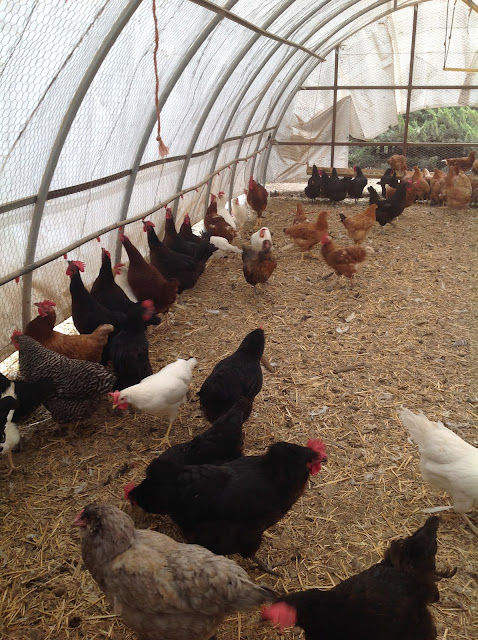Clean Water for Chickens in the Warm and Cold Seasons
In my experience, chickens seem to like drinking dirty water out of a puddle, or something of the sort. One example is when cleaning out dirty buckets, or washing chick waterers in the spring. If any of the adult birds are near when dirty water is on the ground, they are almost always trying to gulp up the muddy water. I don't know why they think that nasty water is better, but I do know that if given the choice between drinking water from a clean source versus a puddle on the ground, a majority of them will choose the puddle.
However, giving the birds their preference of dirty water isn't exactly good for them! Water that is contaminated with dirt, manure, ect... is bound to have more bacteria in it. Period. While drinking water from a puddle from time to time (if it rains) won't hurt the chicken, that doesn't mean it's okay to let the birds eat, drink, and sleep in filth if within your power to keep them from that environment.
The way that I give my chickens water throughout the seasons has recently changed. A few months ago, I switched from giving water in 2 gallon (plastic) pans (year round), to a nipple water system. In comparison, the pans get dirty within a few hours of filling them up, whereas the nipple water system will last several days without having the water reservoir (5 gallon bucket) cleaned. This system keeps the water separated from the outside, which keeps bugs and other debris from being carried in by the wind or a chicken flapping her wings:) The only downside with the nipple waterer is that it only works when temperatures are above freezing (unless the water itself is heated, or is in a heated building). Consequently, the winter months require the plastic pans to deliver water to the chickens since there is no electricity available for the chicken barns.
Still, the water in the pans will freeze at some point, right?
The morning chore in the winter is to either break the ice in the pans, or fill them up with water (does not have to be warm water). Chickens are actually strong enough to break through thin ice with their beaks, or by jumping on the iced-over pans. Since they eat and drink constantly throughout the day, the water doesn't freeze over during the day because it is constantly being disturbed. Of course, there is just a higher chance of the water getting dirty, so it is changed at least 2x's a day or more in the winter.
One thing to note is that there are less bacterial activity in the winter months. A lot of bacteria either are dormant in the winter, or are very sluggish because of the cold. While I have no scientific evidence stating that dirty water has less bacteria in the winter versus summer, it would be logical to assume so based on the typical environmental conditions required for a majority of bacteria to live in. It is also for that reason that raising chicks in the early spring significantly reduces the chance of them getting bacteria-borne illnesses versus raising chicks in the summer, simply because of the temperature difference. However, cleanliness in the bird's living spaces is the biggest determining factor for bacterial populations, whether that be in the bedding, feeders, or waterers. If the floor of the coop is filthy, those bacteria are not guaranteed to stay on the coop floor:)
That being said, don't try to eliminate the bacteria (besides, that's like fighting a losing battle, since bacteria are everywhere). Spraying tons of disinfectant can be even more detrimental to the bird's health. Rather, try to create an environment that isn't conducive to growing tons of bacteria. Spreading fresh bedding daily or weekly is one way to promote a clean environment, which will limit dirty bedding being flicked into the water pans.
Any "junk" that sticks to the sides of the pans, or bucket, gets scrubbed with a brush to keep algae from developing in the summer, and just general grossness away in the winter.



Comments
Post a Comment